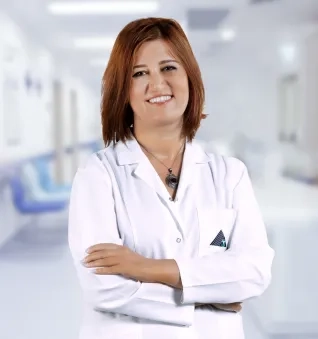Alo Yeditepe
Alo Yeditepe
Pay Attention to Food Allergies in Children!
Food allergies in children have become one of the most talked about topics, especially due to changes in environmental conditions. Expressing that one out of every 17 children is faced with food allergy today, Yeditepe University Kozyatağı Hospital Child Health Diseases and Pediatric Allergy and Immunology Specialist Prof. Dr. Hülya Ercan Sarıçoban, said that the disease is very important for future generations due to factors such as genetic transmission and lifelong survival.
Pediatrics and Pediatric Allergy and Immunology Specialist Prof. Dr. Hülya Ercan Sarıçoban, who said that food allergy symptoms have different symptoms according to the age of children, warned families to be careful because these symptoms are similar to different diseases. Prof. Dr. Sarıçoban said that many factors play a role in food allergies starting from infancy, from genetic factors to environmental factors, from the mother's diet during pregnancy to the packaged foods that children consume more and more every day and gave answers to the questions that families are most curious about.
All Foods in Nature can Cause Allergies
Prof. Dr. Hülya Ercan Sarıçoban, Yeditepe University Kozyatağı Hospital Pediatrics and Pediatric Allergy and Immunology Specialist, reminded that all foods in nature can cause food allergies and gave the following information about other foods that can cause allergies: "Eggs and milk are the most common allergic foods we encounter in young children. As children begin to grow, wheat, soy, and nuts, and as age increases, shellfish, and fish allergies are more common."
Prof. Dr. Ercan, who said Allergic reaction usually has an allergic trigger, so it is possible to distinguish it from different problems, added, "For example, in a child who is allergic to eggs, symptoms occur after eating eggs. In addition, atopic dermatitis holds certain parts of the body such as the joints, neck, and nape. It can be easily distinguished by physicians in terms of the form and location of the rash."
Complaints Vary Based on the Age of the Child
Prof. Dr. Hülya Ercan Sarıçoban stated that allergic reactions showed different symptoms in children according to their age groups and gave the following information:
"In the early stages of infancy, bowel complaints with mucus or bloody-mucous stools, vomiting, indigestion; eczema with dryness-itching-rash on the skin, skin findings with puffy-itching red urticaria (hives) on the skin. With older babies and in early childhood, respiratory complaints such as additional frequent illnesses, frequent bronchitis and bronchiolitis, cough, wheezing, recurrent ear infections, and nasal congestion cause hospital admissions. In older children, symptoms of allergic catarrh such as itching, blurring, tearing in the eyes and frequent sneezing, nasal itching, and runny nose are observed."
Especially if certain complaints have started to recur and there is no other reason to explain them, Prof. Dr. Sarıçoban said, "However, if the complaints are very intense, shortness of breath, fainting, swelling in the body, anaphylaxis, excessive restlessness in children, intense vomiting, and not being able to gain weight, the physician should be consulted as soon as possible."
People Around the Child Must be Informed
Yeditepe University Kozyatağı Hospital Child Health Diseases and Pediatric Allergy and Immunology Specialist Prof. Dr. Hülya Ercan Sarıçoban underlined that it is necessary to be very careful to prevent anaphylaxis, which develops suddenly in food allergies, is severe and causes the whole body to react at the same time and its results are life-threatening and provided the following information on the subject:
"In order to prevent this picture, which we do not want at all, foods that cause allergies should not be consumed with certainty. For this, the contents of all the products consumed must be read, and if you are going to eat outside, you must question what is in it. Not only parents, but also caregivers, caregivers, grandparents, and teachers must be awake in this regard. Everyone around the child should be informed."
Loading Tests Still Gold Standard!
Prof. Dr. Hülya Ercan Sarıçoban, who said that the absence of positive results in children in allergy tests may confuse families, said that loading tests are used as the gold standard that can reveal all food allergies. Reminding that there are two different mechanisms for the emergence of allergic diseases, and this affects the test results, Prof. Dr. Sarıçaban provided the following information on the subject:
"The first of these is immunoglobulin E-mediated allergic diseases, which can appear in tests. This group can be detected by skin or blood tests. There is no age limit for testing. Of course, it is not possible to say 100 percent accuracy. If there is a disease, it will result. The second mechanism for the detection of allergic diseases is the mechanism called non-immunoglobulin E-mediated. This does not show up on blood and skin tests. Because we measure the amount of immunoglobulin E in the tests. Since these are not Ig E mediated, we cannot detect them in tests. Since some of the food allergies are also in this group, it may be as if there is no allergy when the test is performed. However, if the child has the same reaction to a food, there is an allergy. For this reason, if we cannot detect the diagnosis with the allergy tests, we look at in classical skin and blood, we can eliminate the food for a while and then perform the loading tests. These tests are the gold standard, providing near 100 percent reliable results, and no test can beat the loading test."
Press Coverage: cumhuriyet | milliyet | yeniakit | cnnturk | yenicagri | oncevatan | t24 | posta
About
Faculty and Year of Graduation:
Hacettepe University Faculty of Medicine, 2000
”
See Also
- Is Swallowing Cat Hair Dangerous?
- What is Predisposition to Allergy (Atopy)?
- Allergies in Children Can Increase During the Summer Months
- How to Choose Baby Clothes?
- If Your Child is Constantly Getting Sick in the Winter, It Could be Due to Allergies
- Vaccine Rejection Can Lead to Irreversible Problems!
- Children Whose Parents Are Allergic Are More At Risk
- Pay Attention to the Children Who Get Sick Often
- Allergic Disease Rates Increased from 3% to 15% in the Last 20 Years
- High Fever in Children Article Series I
- Genetics is the Key Cause of Food Allergies in Children
- Points to Be Considered in Baby Clothing
- What and How Much Should Children Eat at Which Time of Meal?
- What is the Right Lunch Box for Children?
- Infection Can Cause the Onset of Asthma Disease
Alo Yeditepe





